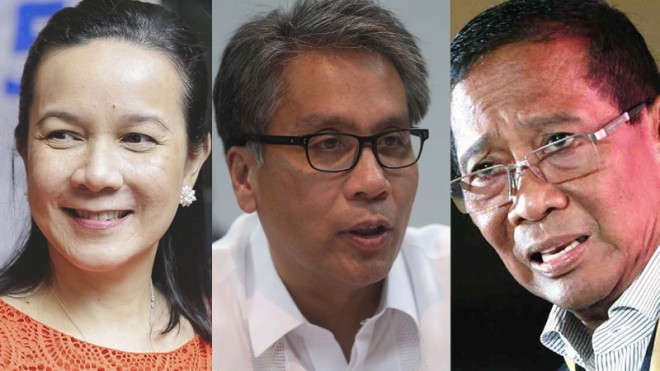The Washington-based Institute of International Finance (IIF) said Sen. Grace Poe or Interior Secretary Mar Roxas becoming President in 2016 would be good for the Philippine economy, while a Binay presidency may undermine the reforms introduced by the Aquino administration.
Amid uncertainties due to next year’s national elections as well as stock market and debt troubles in China and Greece, respectively, IIF lowered its 2015 economic growth forecast for the Philippines to 6.1 percent from 6.3 percent, according to its latest Global Economic Monitor issued on July 15.
IIF, which claims to be “the leading global association of financial institutions, with close to 500 members from more than 70 different countries,” also brought down to 6.3 percent from 6.5 percent its 2016 growth projection for the Philippines.
In a separate report released last month titled “IIF Dispatch: Philippines Update,” it said “[n]ext year’s elections could prove challenging” to the country’s economic transformation in recent years.
“The upcoming presidential election will likely provide a short-term economic boost through government spending and investment, but maintaining policy continuity will be a challenge,” IIF said.
“The typical pre-election infrastructure investment surge would favor Interior and Local Government Secretary Manuel Roxas (President Aquino’s running mate in 2010), but it seems likely that investors will stay on the sideline and wait to see how the new administration shapes up,” it added.
“Sen. Grace Poe, an independent with ties to Mr. Aquino’s Team PNoy, has also recently emerged as a potential contender.”
However, “[i]f the more populist Vice President Jejomar Binay wins, he could undermine the government’s PPP strategy if/when he takes office,” IIF said, referring to the Aquino administration’s centerpiece public-private partnership program.
As of June, the institute noted that Binay had been leading the surveys, with Poe “not far behind,” while Roxas trailed both.
“While a victory for Poe or Roxas would favor continuation of the current administration’s agenda and would be market positive, it is too early to tell how the market would react if Binay wins,” IIF said.
It sees next year’s elections boosting government spending—which is currently underperforming and dragging the economy—as early as the latter part of this year.
“[W]e believe that funds already available at the agency level will make their way into the real economy in the second half of 2015, especially given that the government has a strong incentive to make things happen before the May 2016 elections,” IIF said.
On its website, IIF said its members “include banks, insurance companies, asset managers, sovereign wealth funds, pension funds, central banks and development banks.”
It said its mission was “to support our members in prudently managing risks and to advocate for regulatory, financial and economic policies that are in the broad interest of our members and that foster global financial stability and sustainable economic growth.”
RELATED STORIES
